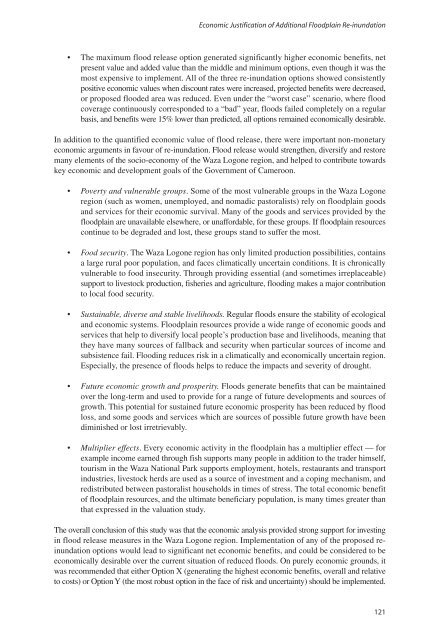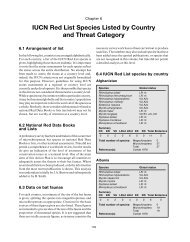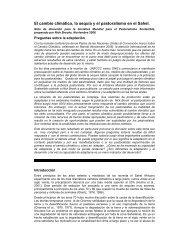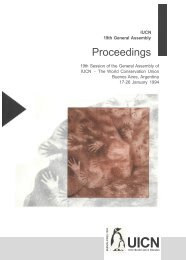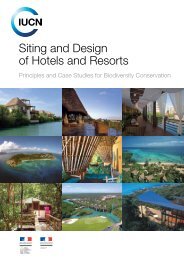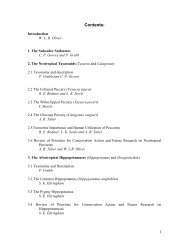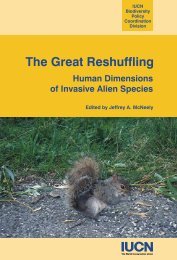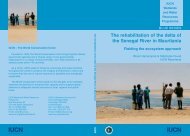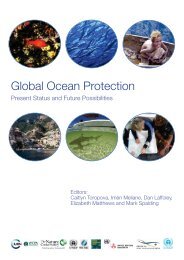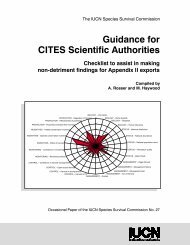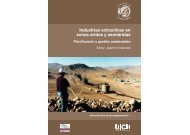The return of the water - IUCN
The return of the water - IUCN
The return of the water - IUCN
You also want an ePaper? Increase the reach of your titles
YUMPU automatically turns print PDFs into web optimized ePapers that Google loves.
Economic Justification <strong>of</strong> Additional Floodplain Re-inundation<br />
• <strong>The</strong> maximum flood release option generated significantly higher economic benefits, net<br />
present value and added value than <strong>the</strong> middle and minimum options, even though it was <strong>the</strong><br />
most expensive to implement. All <strong>of</strong> <strong>the</strong> three re-inundation options showed consistently<br />
positive economic values when discount rates were increased, projected benefits were decreased,<br />
or proposed flooded area was reduced. Even under <strong>the</strong> “worst case” scenario, where flood<br />
coverage continuously corresponded to a “bad” year, floods failed completely on a regular<br />
basis, and benefits were 15% lower than predicted, all options remained economically desirable.<br />
In addition to <strong>the</strong> quantified economic value <strong>of</strong> flood release, <strong>the</strong>re were important non-monetary<br />
economic arguments in favour <strong>of</strong> re-inundation. Flood release would streng<strong>the</strong>n, diversify and restore<br />
many elements <strong>of</strong> <strong>the</strong> socio-economy <strong>of</strong> <strong>the</strong> Waza Logone region, and helped to contribute towards<br />
key economic and development goals <strong>of</strong> <strong>the</strong> Government <strong>of</strong> Cameroon.<br />
• Poverty and vulnerable groups. Some <strong>of</strong> <strong>the</strong> most vulnerable groups in <strong>the</strong> Waza Logone<br />
region (such as women, unemployed, and nomadic pastoralists) rely on floodplain goods<br />
and services for <strong>the</strong>ir economic survival. Many <strong>of</strong> <strong>the</strong> goods and services provided by <strong>the</strong><br />
floodplain are unavailable elsewhere, or unaffordable, for <strong>the</strong>se groups. If floodplain resources<br />
continue to be degraded and lost, <strong>the</strong>se groups stand to suffer <strong>the</strong> most.<br />
• Food security. <strong>The</strong> Waza Logone region has only limited production possibilities, contains<br />
a large rural poor population, and faces climatically uncertain conditions. It is chronically<br />
vulnerable to food insecurity. Through providing essential (and sometimes irreplaceable)<br />
support to livestock production, fisheries and agriculture, flooding makes a major contribution<br />
to local food security.<br />
• Sustainable, diverse and stable livelihoods. Regular floods ensure <strong>the</strong> stability <strong>of</strong> ecological<br />
and economic systems. Floodplain resources provide a wide range <strong>of</strong> economic goods and<br />
services that help to diversify local people’s production base and livelihoods, meaning that<br />
<strong>the</strong>y have many sources <strong>of</strong> fallback and security when particular sources <strong>of</strong> income and<br />
subsistence fail. Flooding reduces risk in a climatically and economically uncertain region.<br />
Especially, <strong>the</strong> presence <strong>of</strong> floods helps to reduce <strong>the</strong> impacts and severity <strong>of</strong> drought.<br />
• Future economic growth and prosperity. Floods generate benefits that can be maintained<br />
over <strong>the</strong> long-term and used to provide for a range <strong>of</strong> future developments and sources <strong>of</strong><br />
growth. This potential for sustained future economic prosperity has been reduced by flood<br />
loss, and some goods and services which are sources <strong>of</strong> possible future growth have been<br />
diminished or lost irretrievably.<br />
• Multiplier effects. Every economic activity in <strong>the</strong> floodplain has a multiplier effect — for<br />
example income earned through fish supports many people in addition to <strong>the</strong> trader himself,<br />
tourism in <strong>the</strong> Waza National Park supports employment, hotels, restaurants and transport<br />
industries, livestock herds are used as a source <strong>of</strong> investment and a coping mechanism, and<br />
redistributed between pastoralist households in times <strong>of</strong> stress. <strong>The</strong> total economic benefit<br />
<strong>of</strong> floodplain resources, and <strong>the</strong> ultimate beneficiary population, is many times greater than<br />
that expressed in <strong>the</strong> valuation study.<br />
<strong>The</strong> overall conclusion <strong>of</strong> this study was that <strong>the</strong> economic analysis provided strong support for investing<br />
in flood release measures in <strong>the</strong> Waza Logone region. Implementation <strong>of</strong> any <strong>of</strong> <strong>the</strong> proposed reinundation<br />
options would lead to significant net economic benefits, and could be considered to be<br />
economically desirable over <strong>the</strong> current situation <strong>of</strong> reduced floods. On purely economic grounds, it<br />
was recommended that ei<strong>the</strong>r Option X (generating <strong>the</strong> highest economic benefits, overall and relative<br />
to costs) or Option Y (<strong>the</strong> most robust option in <strong>the</strong> face <strong>of</strong> risk and uncertainty) should be implemented.<br />
121


